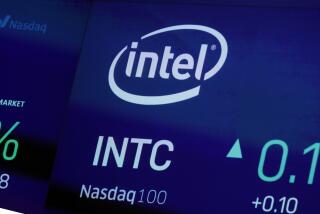Japanese Firms Plan to Reduce Output of Key Computer Chips
- Share via
TOKYO — Leading Japanese semiconductor makers said Tuesday that they plan 10% to 15% cuts in production of key 1-megabit memory chips because of falling prices and lower demand.
Demand for 1-megabit dynamic random-access memory chips, or DRAMs, has fallen in recent months, in large part because of stagnant sales of personal computers in the United States, company officials said.
A 1-megabit chip, currently a mainstay of the computer industry, can store about 1 million binary units of information, the equivalent of about four newspaper pages.
An official at NEC Corp., the world’s largest semiconductor maker, said his company has decided to reduce production from 6 million chips to about 5 million a month in the first quarter of this year.
“With the price for a 1-megabit DRAM falling from around $24 last summer to $9.70 today, NEC has decided to downshift production,” he said.
Although computer sales in Japan have remained stronger than in the United States, prices of 1-megabit DRAMs also have fallen here, to about $10.50 from $14.
The semiconductor industry is known for its sharp business cycles. During a 1985-86 industry recession, Japanese makers, suffering from overcapacity, lost an estimated $4 billion and began a series of price cuts that led to charges of dumping overseas.
An Oki Electric official said his company plans to reduce its production of 1-megabit DRAMs this quarter from 3.5 million chips to fewer than 3 million chips a month.
Hitachi’s production has fallen from 4 million chips to about 3.8 million chips a month, while Mitsubishi Electric’s monthly production has fallen from about 5 million chips to between 4 million and 4.5 million chips, company officials said. A Hitachi official said further cuts were possible if the market continues to weaken.
Fujitsu officials declined to comment on their production plans.






